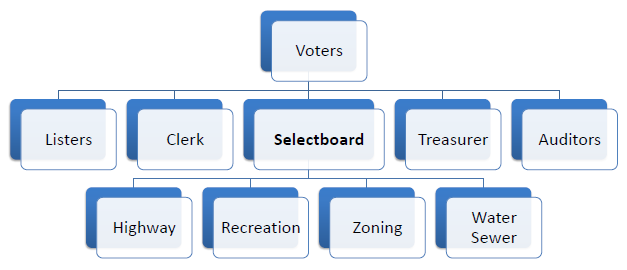
Testimony was provided as presentation slides. The text of those slides is below, you can also download the presentation.
Testimony of the Vermont League of Cities and Towns
Ted Brady, Executive Director
Senate Committee on Government Operations Regarding H.875 Municipal Ethics and Conflicts of Interest
April 11, 2024
VLCT Testimony on H. 875
Sections 22 and 23:
- Establishing a Uniform Municipal Code of Ethics
- Giving the State Ethics Commission Jurisdiction over Municipal Ethics
- Establishing Training, Reporting, and Investigation Requirements for Municipal Officials
- Creating a new right of Civil Action against municipalities and municipal officials
VLCT’s Role in Helping Towns Comply with Conflict of Interest and Ethics Laws:
- VLCT’s Model Ethics and Conflicts of Interest Policy
- VLCT’s Model Land Use Conflict of Interest Policy
- VLCT’s Conflict in Land Use FAQs
- VLCT’s Chart of Incompatible Offices
- VLCT’s Model Personnel Policies
- Managing Conflicts of Interest Webinar
- Annual Selectboard Essentials Training
- Legal Inquiry Service (80 conflict of interest / ethics inquiries in the past 12 months)
Using this expertise, VLCT submitted a recommended approach to addressing municipal ethics to the Ethics Commission last Fall. That input, approved by the VLCT Board of Directors, was largely ignored in drafting H. 875. CLICK HERE TO READ THAT LETTER.
H. 875 Creates New Obligations for Capacity-Strapped Municipalities
- Discards existing conflict of interest policies municipalities have been required to adopt since 2019
- Creates the first and only training requirement for municipal officials – an unspecified ethics, open meeting law, and public records act training (Section 22, § 1995)
- Every municipality will be need to:
- Appoint a “State Ethics Commission liaison”. (Section 22, § 1995)
- Keep records of every municipal officer who received ethics training. (Section 22, § 1996)
- Designate a municipal officer or body to receive complaints. (Section 22, § 1996)
- Investigate ethics complaints. (Section 22, § 1996)
- Maintain records of complaints and the disposition of those complaints on every municipal officer for the entirety of their term plus five years. (Section 22, § 1996)
- Provide the State Ethics Commission with a summary of every complaint, plus the outcome (Section 22, § 1996)
- Municipal officers, employees “or any other individual” are given a new right of civil action against municipalities related to whistleblower protections. (Section 22, § 1997)
What “Municipal Officers” Might Be Impacted? Thousands.
- 1279 Selectboard Members
- 1000+ Planning Commissioners
- 1000+ DRB Members
- 500+ Listers/Assessorts
- 415 Clerks and Treasurers
- 287 Auditors
- 5000+ Certain Employees
- 192 Emergency Management Coordinators
- 220 Zoning Administrators
- Library Trustees
- 229 Moderators
- 119 Managers/Administrators
- 1792 Justices of the Peace
- 204 Constables
- Road Commissioners
VLCT Recommendation 1: Clarify that employed and appointed officials are not covered by the law. Modify the definition of Municipal Official in Section 22 § 1991 (9) to remove (iii) that could be interpreted to mean thousands of other appointed and employed officials are impacted.
VLCT Recommendation 2: Set Expectations of Municipal Officials, But Reduce Reporting, Training and Investigation Requirements in Recognition of Municipal Capacity.
- Remove Section 22 §1995. This equates to a new state unfunded mandate: thousands of hours of annually required training. And officials must complete it every three years. This is the first and only training requirement of any elected municipal officer.
- Remove Section 22 §1996. This provision requires towns to keep records of ethics training, designate an officer to receive complaints, investigate complaints, and hold records of complaints for five plus years. It also requires the municipality to exceed the state requirements of reporting complaints – requiring not only a number of complaints be reported to the Commission, but also a summary and outcome of complaints. The Ethics Commission testified that it didn’t have the resources to keep these records. Municipalities don’t either.
- JFO March 5, 2024, memo dismisses the value of volunteers’ time and the work burden as within “existing duties” of officials: “While this section imposes no costs on municipalities, it does create work associated with recordkeeping and reporting requirements. However, the specific tasks in the draft bill are not burdensome and may fall within the existing duties of city and town clerks or other relevant municipal entities.” This is insulting to every municipal official and demonstrates a lack of knowledge about the roles of independent municipal officers.
- Remove Section 23, requiring thousands of municipal officials take annual training, and specifying that municipalities must maintain the records.
Who’s Holding Who Accountable?
The bill fails to recognize the flat organizational structure of municipal government – which is very different from state government. There is not a hierarchy that puts one elected officer or one appointed officer in charge. Picking someone to be an ethics liaison, to keep records, and to investigate complaints therefore is not as easy as it is in State Government.

VLCT Recommendation 3: Give voters the ability to hold municipal officials accountable by giving all municipalities the ability to adopt recall provisions, as
several municipalities have in existing, Legislatively-approved municipal charters.
VLCT Recommendation 4: Seek to Better Understand Existing Whistleblower Protections in State and Federal Law Before Creating New Liabilities on Municipalities.
- Remove Section 22 §1997. VLCT supports whistleblower protections for municipal employees, but the proposed language is fundamentally flawed, and the Legislature needs more time to get it right. Several state and federal laws already give municipal employees certain protections.
- The proposed whistleblower protections exceed those for state employees contained in 3 V.S.A. 971 – 978.
- The protections extend beyond employees, to include “any municipal officer, municipal employee, or any other individual” [Section 22 §1997 (a)]. This suggests any citizen could file a whistleblower complaint, or that independent officers could be the subject of a complaint from another independent officer.
- The definition of “retaliate” [Section 22 §1991 (12)] exceeds the state whistleblower definitions. Section 22 §1991 (12) (B) would allow any citizen to sue if they felt someone were to “interfere with any right or privilege…” This is overly broad and would create nuisance lawsuits that taxpayers would have to defend through property taxes.
State Whistleblower Statute vs. Muni Whistleblower Provisions
H.875 Holds Municipalities to a Higher Standard than the State
| State Whistleblower Statute - 3 V.S.A. 971 – 978 | Proposed Municipal Whistleblower Statute - H. 875 Section 22 §1997 |
|---|---|
| Only applies to state employees [§ 972 (5)] | Applies to municipal officers, municipal employees, or “any other individual” |
| Defines “retaliatory action” narrowly [§ 972 (4)] | Broad definition of “retaliate” including “interfering with any right or privilege…” |
| Clearly defines protected activity [§ 973] | Broad definition of “protected disclosure” about the ethics code and “other applicable codes” |
| Creates right to claim in Superior Court by state employees [§ 976] | Creates new right of civil action for any “injured individual” – including citizens, other elected municipal officials, and employees |
| Allows lawsuits against the State of Vermont, but not state elected officials | Allows new lawsuits against both municipalities AND municipal officers |
| Recognizes other state and federal laws and labor agreements [§ 975] | Fails to recognize municipal charters, labor agreements, state, or federal laws that already protect municipal employees |
| Prohibits employees from both filing lawsuits and using labor grievance process simultaneously [§ 975] | Silent on whether an injured individual could use both the courts and labor grievance process |
| Does not allow for punitive damages [§ 976] | Allows for punitive damages |
| Creates a window of 180 days to bring action [§978] | Creates a window of up to three years to bring action |
VLCT’s Bottom Line
VLCT supports the fundamental goal of establishing ethical standards, educating people about those standards, and holding people accountable to those standards. We do that work every day, and will continue to do so.
But we request that the committee recognize the burden this bill would place on municipalities and the hypocrisy of holding municipal officials to a different
standard than state officials by taking the following actions before passing this bill:
- Remove Section 22 § 1995-1997.
- Remove Section 23.